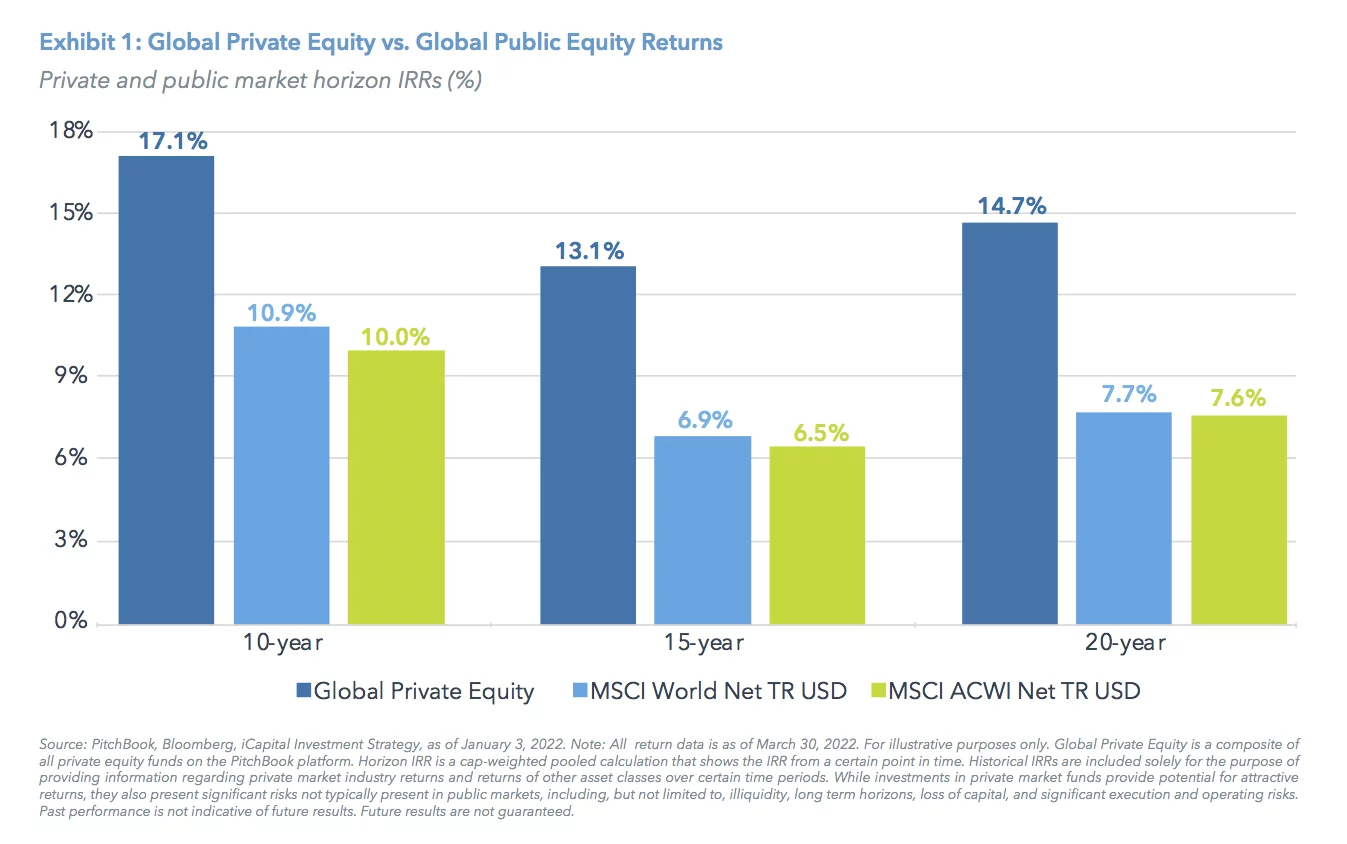Written by: Kunal Shah | iCapital
New financial technology platforms are making it possible for high-net-worth investors to access private market investments that have previously only been available to institutional investors like pension funds, university endowments, and insurance companies.
Private markets have historically outperformed public markets in almost all major asset classes over the 10-, 15- and 20-year periods, as illustrated in Exhibit 1. At the same time, private market investments have distinct risks and characteristics that make them significantly different from traditional investments, like stocks, bonds, and mutual funds. This asset class is not appropriate for all investors, but in certain cases, it can be a valuable addition to a well-diversified portfolio.

Before making a private market investment, investors and their advisors should consider five key questions:
1. What’s Your Time Horizon?
Private market investments take years to mature. It takes time to identify and source the right deals, time to improve the underlying investment, and time to successfully exit the investment. Investors looking to fund obligations years down the road (e.g., retirement, charitable giving, or passing wealth on to younger generations) may find private market opportunities attractive. However, those looking for short-term, tactical allocations may find that other investments are better suited to their purposes.
2. Can You Afford Illiquidity?
By their nature, private market investments are illiquid – they are difficult to buy and sell. The long-time horizon previously discussed may enhance the potential for return, but it is also a key consideration for investors with liquidity needs. While registered funds may offer enhanced liquidity compared to traditional private market structures, most private market funds have 10-year terms and a classic J-curve profile, and may not suit the needs of investors requiring liquidity.
3. Where Does an Investment Fit In Your Overall Portfolio?
An allocation to private markets may provide a variety of benefits to a portfolio: higher return potential, lower correlation to the public markets, and diversification. Some investors may add a private market investment as part of their overall equity strategy for its potential to deliver outsized returns. Others may find it an attractive counterbalance to publicly traded investments or highly correlated assets in their portfolio. Regardless of the size of the allocation or its role in the portfolio, investors should ask themselves what they are looking to achieve with a private markets allocation, and work with a financial professional to monitor if the position is performing as anticipated.
4. Are You Comfortable With Less Transparency Into Performance?
Consistent reassurance about performance via daily price quotes or frequent reporting, as is the custom in the public markets, is not made available for private market investments. While private market fund managers report returns and significant portfolio developments to their investors on a quarterly basis, private market investment holdings are inherently difficult to value, and it can be hard to quantify the impact a manager has had on underlying investments until those investments are sold. It is worth noting, however, that the visibility into public market movements daily can cause investors to buy or sell based on fear or other momentum-related sentiment, which is generally not the ideal approach. Conversely, with a private market investment, investors are placing their faith in the manager to create value over a long period of time, with results that are difficult to appraise until the latter half of the fund’s life. This is an important reason why thorough due diligence is key prior to investing.
5. Are You Comfortable With the Private Market Fund and Pricing Structures?
The concepts of performance fee, capital commitment, draw down, and distribution structure of private market funds may be unfamiliar for some and difficult to prepare for. Investors considering private market investments should make sure they understand their responsibilities as a limited partner, as well as all fees and expenses before investing.
Determining whether a private market fund is an appropriate investment requires an in-depth evaluation of an individual’s financial situation and portfolio objectives. Prospective investors should discuss their goals and potential risks with a financial professional before investing.
Related: Putting Yields to Work: Short-Duration, High Yield Bonds

